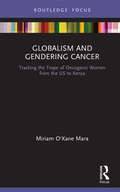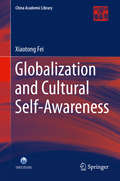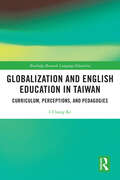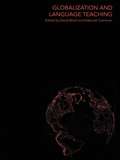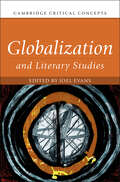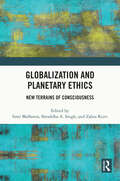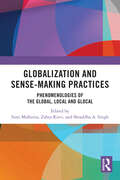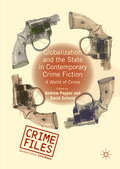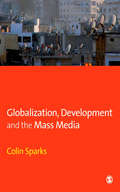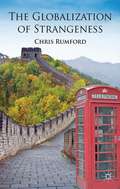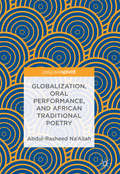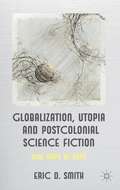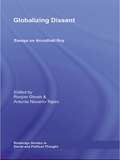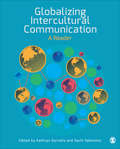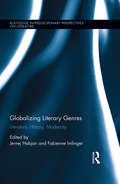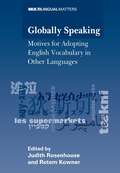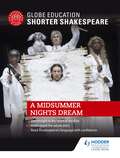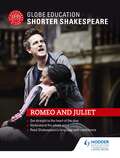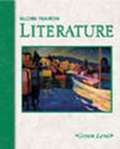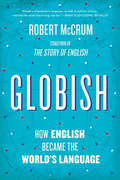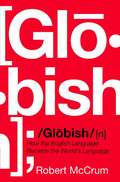- Table View
- List View
Globalism and Gendering Cancer: Tracking the Trope of Oncogenic Women from the US to Kenya (Routledge Focus on Communication Studies)
by Miriam O'Kane MaraThis book connects a rhetorical examination of medical and public health policy documents with a humanistic investigation of cultural texts to uncover the link between gendered representations of health and cancer. The author argues that in western biomedical contexts cancer is considered a women’s disease and their bodies are treated as inherently oncogenic or cancer-producing, which leads to biomedical practices that adversely impact their bodily autonomy. She examines how these biases traverse national boundaries by examining the transmission of biomedical cancer practices from the US and international organizations to Kenya. This book is suited to scholars and students working in the fields of Rhetorics of Health and Medicine, Medical Humanities and Gender Studies. It is also of interest to medical professionals and readers interested in globalism and global health.
Globalization and Cultural Self-Awareness
by Xiaotong FeiThis volume comprises some twenty articles, speeches and conversations of Fei Xiaotong from the late 1980s to the early 2000s. Their central connecting theme is how civilizations could co-exist against a backdrop of rapid globalization. Fei proposes his concept of "cultural self-awareness," summarized in the axiom "each appreciates his own best, appreciates the best of others, all appreciate the best together for the greater harmony of all. " This is the result of many years of research and fieldwork, and represents a synthesis of his Western training and traditional Chinese thought. Professor Fei Xiaotong was one of the most prominent Chinese sociologists and anthropologists in the last century, and a leading figure in Chinese intellectual circles. He was noted in the West for his Peasant Life in China, From the Soil and other works written during the 1930s and 1940s. His later important research and theoretical concepts, though extremely influential in China on both theoretical and practical levels, are almost unknown in international academia.
Globalization and English Education in Taiwan: Curriculum, Perceptions, and Pedagogies (Routledge Research in Language Education)
by I-Chung KeKe’s book examines and reflects on English education in Taiwan from a global English perspective, starting with a discussion on globalization and global Englishes. English education in Taiwan has gone through various major transformations since the intensification of globalization after the 1990s. On one hand, children start to learn English ever earlier while on the other hand, the curriculum and materials in the vocational schools and at the tertiary level become diversified to meet various specific needs of English use. Internationalization of education has brought increasing numbers of international students, and the roles of English in Taiwan are changing constantly with the dynamic environment, from a foreign language to a lingua franca, medium of instruction, and an international language. In his book, the author documents the historical development of education and the roles of English in Taiwan before reviewing curriculum reforms and changes in the past half century. He then presents teachers' and students’ perceptions on global Englishes. He proposes global Englishes pedagogies and his views on what changes can be made to textbooks, learning materials, entrance exams, translation, and the linguistic environment. Practical suggestions to English education in Taiwan in the globalizing context serve as tentative conclusion for the book. Offering insights into English education and its relationship with globalization, Ke’s book will be useful to researchers and students in the fields of global Englishes and English education as well as offering practical pedagogical suggestions for English educators around the world.
Globalization and Language Teaching
by David Block Deborah CameronThis book considers the issues globalization raises for second language learning and teaching. Block and Cameron's collection shows how, in an economy based on services and information, the linguistic skills of workers becomes increasingly important. New technologies make possible new kinds of language teaching, and language becomes an economic commodity with a value in the global marketplace. This has implications for how and why people learn languages, and for which languages they learn.Drawing together the various strands of the globalization debate, this rich and varied collection of contributions explores issues such as:*The commodification of language(s) and language skills*The use of new media and new technologies in language learning and teaching*The effects of globalization on the language teaching industry*New forms of power and resistance.
Globalization and Literary Studies (Cambridge Critical Concepts)
by Joel EvansThis book provides a history of the way in which literature not only reflects, but actively shapes processes of globalization and our notions of global phenomena. It takes in a broad sweep of history, from antiquity, through to the era of imperialism and on to the present day. Whilst its primary focus is our own historical conjuncture, it looks at how earlier periods have shaped this by tracking key concepts that are imbricated with the concept of globalization, from translation, to empire, to pandemics and environmental collapse. Drawing on these older themes and concerns, it then traces the germ of the relation between global phenomena and literary studies into the 20th and 21st centuries, exploring key issues and frames of study such as contemporary slavery, the digital, world literature and the Anthropocene.
Globalization and Planetary Ethics: New Terrains of Consciousness
by Simi Malhotra Shraddha A. Singh Zahra RizviThis volume is a critical investigation into the contemporary phenomenon of the dissensus of the globe and the planet, and the new terrains of consciousness that need to be negotiated towards a possibility for transformation. It examines the possibilities of alternate, sustainable modes of being and existing in a world which requires a unified, ethical, biopolitical worldview. The book explores themes like philosophical posthumanism and planetary concerns; disruption of cultural and intellectual inequality; bodily movement through nomadic subjectivity; dystopic spatialities of game(re)play; globalization, and speculative imaginaries of the body; and theory of multiplicity. It also discusses the impact of COVID-19 on human beings, the role of the neoliberal media, the question of rights of robots and cyborgs in sci-fi movies, and representation of refugees in literature. This book will be of interest to scholars and researchers of English literature, political philosophy, cultural studies, literary cultures, post-colonial studies, critical theory, and social anthropology.
Globalization and Sense-Making Practices: Phenomenologies of the Global, Local and Glocal
by Simi Malhotra, Zahra Rizvi, and Shraddha A. SinghThis book presents a critical analysis of sense-making practices through an exploration of acoustic, creative, and artistic spaces. It studies how local cultures of sight, hearing, smell, taste, and touch are impacted by global discourses and media, such as television, popular music, digital media, and literature. The authors look at sense-making practices and spatial discourses through an interconnected discussion on thought and experience that seeks to present a multidimensional cartography of the global, the local, and the glocal, to closely analyze the phenomenon of globalization. The volume is an investigation of the possibilities of alternate, sustainable modes of being and existing in a world which requires a unified, ethical, biopolitical worldview that challenges the disparity of its fragments while speculating on their synesthetic conditionality. A unique contribution, the book will be of interest to scholars and researchers of English literature, media studies, cultural studies, literary cultures, post-colonial studies, globalization studies, philosophy, critical theory, sociology, and social anthropology.
Globalization and the State in Contemporary Crime Fiction
by Andrew Pepper David SchmidWhy has crime fiction become a global genre? How do writers use crime fiction to reflect upon the changing nature of crime and policing in our contemporary world? This book argues that the globalization of crime fiction should not be celebrated uncritically. Instead, it looks at the new forms and techniques writers are using to examine the crimes and policing practices that define a rapidly changing world. In doing so, this collection of essays examines how the relationship between global crime, capitalism, and policing produces new configurations of violence in crime fiction - and asks whether the genre can find ways of analyzing and even opposing such violence as part of its necessarily limited search for justice both within and beyond the state.
Globalization, Development and the Mass Media (Media Culture And Society Ser.)
by Colin SparksGlobalization, Development and the Mass Media gives a comprehensive and critical account of the theoretical changes in communication studies from the early theories of development communication through to the contemporary critiques of globalization. It examines two main currents of thought. Firstly, the ways in which the media can be used to effect change and development. It traces the evolution of thinking from attempts to spread ′modernity′ by way of using the media through to alternative perspectives based on encouraging participation in development communication. Secondly, the elaboration of the theory of media imperialism, the criticisms that it provoked and its replacement as the dominant theory of international communication by globalization.
The Globalization of Strangeness
by Chris RumfordThe figure of the stranger is in serious need of revision, as is our understanding of the society against which the stranger is projected. Under conditions of globalization, inside/outside markers have been eroded and conventional indicators of 'we-ness' are no longer reliable. We now live in a generalized state of strangeness, one consequence of globalization: we no longer know where our community ends and another one begins. In such circumstances it is often the case that neighbours are the nearest strangers. Strangeness occurs when global consciousness outstrips global connectivity and this means that we need to rethink some core elements of globalization theory. Under conditions of strangeness the stranger is a 'here today, gone tomorrow' figure. This book identifies the cosmopolitan stranger as the most significant contemporary figure of the stranger, one adept at negotiating the 'confined spaces' of globalization in order to promote new forms of social solidarity and connect with distant others.
Globalization, Oral Performance, and African Traditional Poetry
by Abdul-Rasheed Na’AllahThis book discusses globalization trends and influences on traditional African oral literary performance and the direction that Ilorin oral art is forced to take by the changes of the twenty-first century electronic age. It seeks a new definition of contemporary African bourgeois in terms of its global reach, imitation of foreign forms and collaboration with the owners of the primary agencies. Additionally, it makes a case that African global lords or new bourgeoisie who are largely products of the new global capital and multinational corporations’ socio-political and cultural influences fashion their tastes after western cultures as portrayed in the digital realm.
Globalization, Utopia, and Postcolonial Science Fiction
by Eric D. SmithThis study considers the recent surge of science fiction narratives from the postcolonial Third World as a utopian response to the spatial, political, and representational dilemmas that attend globalization.
Globalizing Dissent: Essays on Arundhati Roy (Routledge Studies in Social and Political Thought)
by Ranjan Ghosh Antonia Navarro-TejeroArundhati Roy is not only an accomplished novelist, but equally gifted in unraveling the politics of globalization, the power and ideology of corporate culture, fundamentalism, terrorism, and other issues gripping today’s world. This volume – featuring prominent scholars from throughout the world – examines Roy beyond the aesthetic parameters of her fiction, focusing also on her creative activism and struggles in global politics. The chapters travel to and fro between her non-fictional works – engaging activism on the streets and global forums – and its underlying roots in her novel. Roy is examined as a novelist, non-fiction writer, journalist, activist, feminist, screenwriter, ideologist, and architect. This volume presents Roy's interlocking network of the ideas, attitudes and ideologies that emerge from the contemporary social and the political world.
Globalizing Intercultural Communication: A Reader
by Kathryn Sorrells Sachi SekimotoTranslating Theory into Practice Globalizing Intercultural Communication: A Reader introduces students to intercultural communication within the global context, and equips them with the knowledge and understanding to grapple with the dynamic, interconnected and complex nature of intercultural relations in the world today. This reader is organized around foundational and contemporary themes of intercultural communication. Each of the 14 chapters pairs an original research article explicating key topics, theories, or concepts with a first-person narrative that brings the chapter content alive and invites students to develop and apply their knowledge of intercultural communication. Each chapter’s pair of readings is framed by an introduction highlighting important issues presented in the readings that are relevant to the study and practice of intercultural communication and end-of-chapter pedagogical features including key terms and discussion questions. In addition to illuminating concepts, theories, and issues, authors/editors Kathryn Sorrells and Sachi Sekimoto focus particular attention on grounding theory in everyday experience and translating theory into practice and actions that can be taken to promote social responsibility and social justice.
Globalizing Intercultural Communication: A Reader
by Kathryn Sorrells Sachi SekimotoTranslating Theory into Practice Globalizing Intercultural Communication: A Reader introduces students to intercultural communication within the global context, and equips them with the knowledge and understanding to grapple with the dynamic, interconnected and complex nature of intercultural relations in the world today. This reader is organized around foundational and contemporary themes of intercultural communication. Each of the 14 chapters pairs an original research article explicating key topics, theories, or concepts with a first-person narrative that brings the chapter content alive and invites students to develop and apply their knowledge of intercultural communication. Each chapter’s pair of readings is framed by an introduction highlighting important issues presented in the readings that are relevant to the study and practice of intercultural communication and end-of-chapter pedagogical features including key terms and discussion questions. In addition to illuminating concepts, theories, and issues, authors/editors Kathryn Sorrells and Sachi Sekimoto focus particular attention on grounding theory in everyday experience and translating theory into practice and actions that can be taken to promote social responsibility and social justice.
Globalizing Literary Genres: Literature, History, Modernity (Routledge Interdisciplinary Perspectives on Literature)
by Jernej Habjan Fabienne ImlingerFocused on the relation between processes of globalization and literary genres, this volume intervenes in the prevalent notions of globalization, literary history, genre, and the novel. Using both close reading and world history, both literary criticism and political theory, the book is a timely intervention in the debates about world, postcolonial, and transnational literature as they have been intensified by critical globalization studies, world-systems analysis, Bourdieuan sociology, and cosmopolitanism studies. It contends that globalization, far from starting in recent decades, has a long and complex history, not unlike the history of literature itself, meaning that when we speak of globalization and literature, we in effect invoke the entire history of literature. Essays examine literary genres in relation to broader historical processes, connecting the present state of globalization to such key world-historic events as the early modern geographical and scientific explorations, the Enlightenment, the expansions of modernity in the long nineteenth and twentieth centuries, postmodernity and postcoloniality, and contemporary counter-hegemonic movements. The book offers innovative readings of the pastoral from Saint-Pierre to Carpentier; the novel in Kant and Wieland, and in Diderot and Marx; travel writing from Verne to Cortázar; sports writing in James and Kahn; entrelacement in Bolaño, Ghosh, and Soderbergh; and also the Mozambican ghost story, Indian genre fiction, "fake" autobiographies, Sephardic "language memoirs," the postcolonial Gothic, Irish "chick lit," and counter-hegemonic novels. Making important theoretical contributions to a renewed discussion about genre, especially genres of narrative fiction, this volume addresses global studies, the history of the novel, and debates over periodization and nationalism in literary history.
Globally Speaking
by Judith Rosenhouse Rotem KownerThis volume accounts for the motives for contemporary lexical borrowing from English, using a comparative approach and a broad cross-cultural perspective. It investigates the processes involved in the penetration of English vocabulary into new environments and the extent of their integration into twelve languages representing several language families, including Icelandic, Dutch, French, Russian, Hungarian, Hebrew, Arabic, Amharic, Persian, Japanese, Taiwan Chinese, and several languages spoken in southern India. Some of these languages are studied here in the context of borrowing for the first time ever. All in all, this volume suggests that the English lexical 'invasion', as it is often referred to, is a natural and inevitable process. It is driven by psycholinguistic, sociolinguistic, and socio-historical factors, of which the primary determinants of variability are associated with ethnic and linguistic diversity.
Globe Education Shorter Shakespeare: Macbeth
by Globe EducationGet straight to the heart of Shakespeare's Macbeth; students' confidence and understanding develop faster as they explore the plot, themes and Shakespeare's language, which is supported throughout this abridged play text from Globe Education.This title:- Reduces the length of the play by a third, while preserving the intricacies of the plot, enabling students to engage with the whole story in the class time available- Builds understanding of Shakespeare's language by providing a detailed glossary alongside the text for quick and easy reference, plus a range of language-focused activities- Offers a tried-and-tested approach to introducing Shakespeare, based on Globe Education's shortened 'Playing Shakespeare' productions that have been seen and appreciated by over 150,000 students- Helps students form their own personal responses to Shakespeare's Macbeth, stimulated by stunning photographs from Globe productions and questions that reflect on context, characters and themes- Lays the foundations for GCSE success by including activities that target the skills needed for the assessment objectivesFree teacher supportShorter Shakespeare: Macbeth is supported by free online teaching resources for each scene:- Teaching notes with guidance on how to approach the scene - Practical group activities to use in the classroom- Questions on language, context, themes, character and performance - Web links to extra resources including photographs from Globe productions, interviews with actors and contextual informationThis title is also accompanied by 10 video clips from Globe Education's shortened 'Playing Shakespeare' production of Macbeth.
Globe Education Shorter Shakespeare: Macbeth
by Globe EducationExam Board: AQA, Edexcel, OCR & WJECLevel: KS3Subject: EnglishFirst Teaching: September 2015First Exam: June 2018Get straight to the heart of Shakespeare's Macbeth; students' confidence and understanding develop faster as they explore the plot, themes and Shakespeare's language, which is supported throughout this abridged play text from Globe Education.This title:- Reduces the length of the play by a third, while preserving the intricacies of the plot, enabling students to engage with the whole story in the class time available- Builds understanding of Shakespeare's language by providing a detailed glossary alongside the text for quick and easy reference, plus a range of language-focused activities- Offers a tried-and-tested approach to introducing Shakespeare, based on Globe Education's shortened 'Playing Shakespeare' productions that have been seen and appreciated by over 150,000 students- Helps students form their own personal responses to Shakespeare's Macbeth, stimulated by stunning photographs from Globe productions and questions that reflect on context, characters and themes- Lays the foundations for GCSE success by including activities that target the skills needed for the assessment objectivesFree teacher supportShorter Shakespeare: Macbeth is supported by free online teaching resources for each scene:- Teaching notes with guidance on how to approach the scene - Practical group activities to use in the classroom- Questions on language, context, themes, character and performance - Web links to extra resources including photographs from Globe productions, interviews with actors and contextual informationThis title is also accompanied by 10 video clips from Globe Education's shortened 'Playing Shakespeare' production of Macbeth.
Globe Education Shorter Shakespeare: A Midsummer Night's Dream
by Globe EducationExam Board: Non-SpecificLevel: KS3Subject: EnglishFirst Teaching: September 2015First Exam: Summer 2018Get straight to the heart of Shakespeare's A Midsummer Night's Dream; students' confidence and understanding develop faster as they explore the plot, themes and Shakespeare's language, which is supported throughout this abridged play text from Globe Education.This title:- Reduces the length of the play by a third, while preserving the intricacies of the plot, enabling students to engage with the whole story in the class time available- Builds understanding of Shakespeare's language by providing a detailed glossary alongside the text for quick and easy reference, plus a range of language-focused activities- Offers a tried-and-tested approach to introducing Shakespeare, based on Globe Education's shortened 'Playing Shakespeare' productions that have been seen and appreciated by over 150,000 students- Helps students form their own personal responses to Shakespeare's A Midsummer Night's Dream, stimulated by stunning photographs from Globe productions and questions that reflect on context, characters and themes- Lays the foundations for GCSE success by including activities that target the skills needed for the assessment objectivesFree teacher supportShorter Shakespeare: A Midsummer Night's Dream is supported by free online teaching resources for each scene:- Teaching notes with guidance on how to approach the scene - Practical group activities to use in the classroom- Questions on language, context, themes, character and performance - Web links to extra resources including photographs from Globe productions, interviews with actors and contextual informationThis title is also accompanied by 10 video clips from Globe Education's shortened 'Playing Shakespeare' production of A Midsummer Night's Dream.
Globe Education Shorter Shakespeare: Romeo and Juliet
by Globe EducationExam Board: Non-SpecificLevel: KS3Subject: EnglishFirst Teaching: September 2015First Exam: Summer 2018Get straight to the heart of Shakespeare's Romeo and Juliet; students' confidence and understanding develop faster as they explore the plot, themes and Shakespeare's language, which is supported throughout this abridged play text from Globe Education.This title:- Reduces the length of the play by a third, while preserving the intricacies of the plot, enabling students to engage with the whole story in the class time available- Builds understanding of Shakespeare's language by providing a detailed glossary alongside the text for quick and easy reference, plus a range of language-focused activities- Offers a tried-and-tested approach to introducing Shakespeare, based on Globe Education's shortened 'Playing Shakespeare' productions that have been seen and appreciated by over 150,000 students- Helps students form their own personal responses to Shakespeare's Romeo and Juliet, stimulated by stunning photographs from Globe productions and questions that reflect on context, characters and themes- Lays the foundations for GCSE success by including activities that target the skills needed for the assessment objectivesFree teacher supportShorter Shakespeare: Romeo and Juliet is supported by free online teaching resources for each scene:- Teaching notes with guidance on how to approach the scene - Practical group activities to use in the classroom- Questions on language, context, themes, character and performance - Web links to extra resources including photographs from Globe productions, interviews with actors and contextual informationThis title is also accompanied by 10 video clips from Globe Education's shortened 'Playing Shakespeare' production of Romeo and Juliet.
Globe Fearon Literature, Gold Level: Reading Level 9-10
by GlobeMoves students gradually from guided reading to independent reading and critical thinking with margin notes. Boosts students' interest and abilities with reading skills for each selection that help low-level readers and students moving from developmental reading classes. Broadens students' exposure to classic literature, some of which has been lightly adapted to maintain author integrity and increase comprehension.
Globe Fearon Literature, Green Level
by Global Fearon StaffWelcome to Globe Fearon Literature. As you read this textbook, you will learn about many new worlds. By reading literature you can experience the past and the future, and you can learn about people--how they feel and how they think. To get the most out of this book, you will need to become an active reader. Active readers think about reading materials before they begin, during, and after they read.
Globish: How English Became the World's Language
by Robert Mccrum"A fascinating study not only of the roots and growth of our own language but of its future."--Bloomsbury Review It seems impossible: a small island in the North Atlantic, colonized by Rome, then pillaged for hundreds of years by marauding neighbors, becomes the dominant world power in the nineteenth century. In this provocative new look at the course of empire, Robert McCrum shows how the language of the Anglo-American imperium has become the world's lingua franca. In the twenty-first century, writes the author, English + Microsoft = Globish.
Globish: How the English Language Became the World's Language
by Robert MccrumIn this provocative and compelling new work, the co-author of the bestselling book and television series "The Story of English" shows how English became the language of the world.
